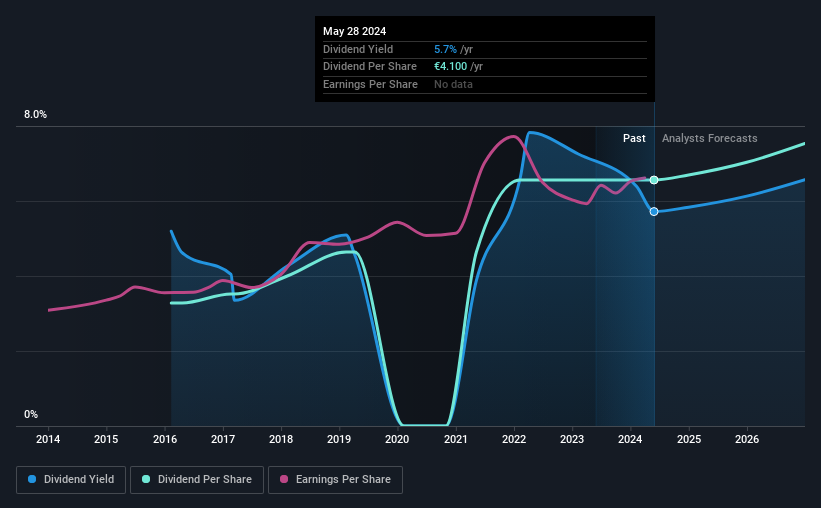
Regular readers will know that we love our dividends at Simply Wall St, which is why it's exciting to see Amundi S.A. (EPA:AMUN) is about to trade ex-dividend in the next 4 days. The ex-dividend date is one business day before a company's record date, which is the date on which the company determines which shareholders are entitled to receive a dividend. The ex-dividend date is important because any transaction on a stock needs to have been settled before the record date in order to be eligible for a dividend. Meaning, you will need to purchase Amundi's shares before the 3rd of June to receive the dividend, which will be paid on the 5th of June.
The company's next dividend payment will be €4.10 per share. Last year, in total, the company distributed €4.10 to shareholders. Looking at the last 12 months of distributions, Amundi has a trailing yield of approximately 5.7% on its current stock price of €71.70. Dividends are a major contributor to investment returns for long term holders, but only if the dividend continues to be paid. As a result, readers should always check whether Amundi has been able to grow its dividends, or if the dividend might be cut.
View our latest analysis for Amundi
If a company pays out more in dividends than it earned, then the dividend might become unsustainable - hardly an ideal situation. Amundi paid out more than half (72%) of its earnings last year, which is a regular payout ratio for most companies.
Generally speaking, the lower a company's payout ratios, the more resilient its dividend usually is.
Click here to see the company's payout ratio, plus analyst estimates of its future dividends.

Have Earnings And Dividends Been Growing?
Stocks in companies that generate sustainable earnings growth often make the best dividend prospects, as it is easier to lift the dividend when earnings are rising. If business enters a downturn and the dividend is cut, the company could see its value fall precipitously. With that in mind, we're encouraged by the steady growth at Amundi, with earnings per share up 6.5% on average over the last five years.
The main way most investors will assess a company's dividend prospects is by checking the historical rate of dividend growth. Since the start of our data, eight years ago, Amundi has lifted its dividend by approximately 9.1% a year on average. We're glad to see dividends rising alongside earnings over a number of years, which may be a sign the company intends to share the growth with shareholders.
Final Takeaway
Is Amundi an attractive dividend stock, or better left on the shelf? Earnings per share have been growing at a reasonable rate, and the company is paying out a bit over half its earnings as dividends. It might be worth researching if the company is reinvesting in growth projects that could grow earnings and dividends in the future, but for now we're on the fence about its dividend prospects.
So if you want to do more digging on Amundi, you'll find it worthwhile knowing the risks that this stock faces. In terms of investment risks, we've identified 1 warning sign with Amundi and understanding them should be part of your investment process.
Generally, we wouldn't recommend just buying the first dividend stock you see. Here's a curated list of interesting stocks that are strong dividend payers.
If you're looking to trade Amundi, open an account with the lowest-cost platform trusted by professionals, Interactive Brokers.
With clients in over 200 countries and territories, and access to 160 markets, IBKR lets you trade stocks, options, futures, forex, bonds and funds from a single integrated account.
Enjoy no hidden fees, no account minimums, and FX conversion rates as low as 0.03%, far better than what most brokers offer.
Sponsored ContentNew: Manage All Your Stock Portfolios in One Place
We've created the ultimate portfolio companion for stock investors, and it's free.
• Connect an unlimited number of Portfolios and see your total in one currency
• Be alerted to new Warning Signs or Risks via email or mobile
• Track the Fair Value of your stocks
Have feedback on this article? Concerned about the content? Get in touch with us directly. Alternatively, email editorial-team (at) simplywallst.com.
This article by Simply Wall St is general in nature. We provide commentary based on historical data and analyst forecasts only using an unbiased methodology and our articles are not intended to be financial advice. It does not constitute a recommendation to buy or sell any stock, and does not take account of your objectives, or your financial situation. We aim to bring you long-term focused analysis driven by fundamental data. Note that our analysis may not factor in the latest price-sensitive company announcements or qualitative material. Simply Wall St has no position in any stocks mentioned.
About ENXTPA:AMUN
Adequate balance sheet average dividend payer.
Similar Companies
Market Insights
Community Narratives



